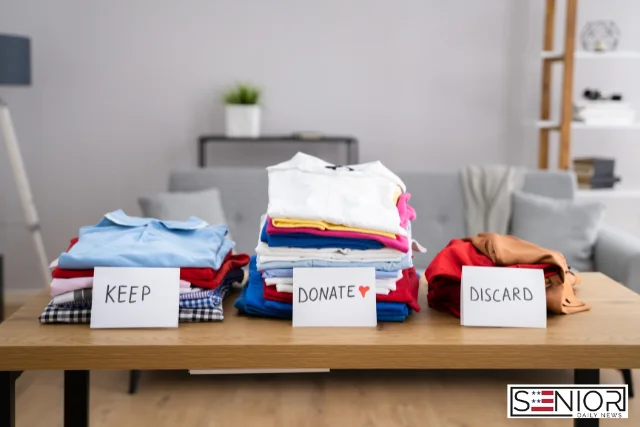Home Decluttering Guide for Seniors Over 60

As the years go by, our homes tend to fill with memories, keepsakes, and sometimes more “stuff” than we realize. While every photo, book, or souvenir may once have held a special place, too much clutter can become overwhelming—both emotionally and physically. For seniors over 60, decluttering is more than just tidying up; it’s about creating a safe, comfortable, and peaceful environment that truly reflects what matters most. This home decluttering guide is designed to help seniors take thoughtful steps toward letting go of excess, while holding onto items that spark joy, meaning, and purpose.
Why Home Decluttering Matters for Seniors
Decluttering at any stage of life can feel liberating, but for seniors, it takes on extra importance. Over the years, clutter can pile up in attics, garages, closets, and basements. Too much of it can create tripping hazards, limit mobility, and even add stress to daily living. A well-organized home is not only safer but also easier to maintain.
On an emotional level, decluttering helps seniors take stock of their life and surround themselves with the things they love most. It can reduce anxiety, improve mental clarity, and even make everyday activities more enjoyable. For those considering downsizing or preparing for a move, home decluttering is an essential first step.
Common Challenges Seniors Face in Decluttering
Decluttering is often easier said than done. Seniors face unique challenges, such as:
- Emotional attachment: Deciding what to part with is tough when objects hold deep sentimental value.
- Physical limitations: Lifting heavy boxes or climbing ladders can be risky.
- Decision fatigue: Sorting through decades of belongings can feel overwhelming.
- Family expectations: Children or relatives may want to hold onto certain items, making decisions more complicated.
Acknowledging these challenges is the first step toward overcoming them.
Getting Started: A Gentle Approach
When beginning a home decluttering journey, it’s important not to rush. Start small, one drawer or one closet at a time. This approach prevents overwhelm and builds momentum.
Here are a few practical first steps:
- Set a goal. Decide why you’re decluttering—whether it’s to make your home safer, prepare for a move, or simply feel more at ease.
- Enlist help. Ask a family member, friend, or professional organizer for assistance. Having support can make the process less stressful.
- Create categories. Sort items into four groups: Keep, Donate, Sell, and Discard.
- Use the “joy test.” Ask yourself if an item brings happiness or serves a real purpose. If not, it may be time to let it go.
Room-by-Room Home Decluttering Guide
Breaking down the process room by room helps seniors stay focused and makes the task manageable.
Living Room
- Keep only furniture that is comfortable and safe to navigate around.
- Limit knickknacks to a few meaningful pieces.
- Organize books and magazines—donate extras to libraries or senior centers.
Kitchen
- Discard duplicate utensils, worn-out pans, or expired food.
- Keep only the appliances you use regularly.
- Store everyday items within easy reach to avoid straining.
Bedroom
- Simplify clothing by keeping only what fits and feels comfortable.
- Consider donating extra bedding and blankets.
- Keep nightstands clutter-free to promote better sleep.
Bathroom
- Toss expired medications and toiletries.
- Install shelves or organizers for easy access.
- Reduce the number of products to the essentials.
Garage or Basement
- Donate tools or equipment no longer in use.
- Properly dispose of old paint, chemicals, or broken appliances.
- Keep storage bins clearly labeled and easy to lift.
Decluttering Sentimental Items Without Regret
One of the hardest parts of home decluttering is parting with sentimental belongings. A helpful method is to preserve the memory without keeping the item. For example:
- Take photos of items before donating them.
- Create a scrapbook of letters, cards, or keepsakes.
- Pass cherished heirlooms on to children or grandchildren.
- Choose one or two symbolic items from a collection instead of keeping the entire set.
This way, the memory remains while the clutter reduces.
The Emotional Benefits of Decluttering
Decluttering isn’t just about organizing; it’s also about emotional well-being. Seniors often find that letting go of excess possessions helps them feel lighter, freer, and more in control. It also reduces stress and anxiety, creating a sense of peace within the home. In fact, many seniors report feeling renewed energy and joy after completing a home decluttering project.
Safety Considerations While Decluttering
Safety is paramount during decluttering. Seniors should avoid heavy lifting, use proper step stools instead of chairs, and take breaks often. Good lighting is important to prevent falls, and it’s wise to wear supportive shoes while moving items. If physical limitations are a concern, hiring a professional organizer or asking loved ones for help is the safest option.
Downsizing and Preparing for the Future
For many seniors, home decluttering is a step toward downsizing. Whether moving to a smaller home, a retirement community, or simply preparing for the future, decluttering now makes transitions smoother. Downsizing doesn’t mean giving up everything—it means creating a home that suits your current lifestyle.
When downsizing, prioritize the items you use daily, followed by those that bring the most joy. Everything else can be sold, donated, or gifted to family.
Tips to Stay Organized After Decluttering
Decluttering is only the beginning. To keep your home clutter-free:
- Adopt a “one in, one out” rule—when something new comes in, let something old go.
- Schedule seasonal mini-decluttering sessions.
- Keep surfaces clear by returning items to their proper place immediately.
- Avoid impulse purchases by asking: “Do I really need this?”
By staying mindful, you can maintain the benefits of a clean, uncluttered home.
Home Decluttering Support and Resources for Seniors
Seniors don’t need to go through this process alone. Helpful resources include:
- Professional organizers who specialize in working with older adults.
- Community donation centers such as Goodwill, Salvation Army, or local churches.
- Senior move managers who assist with downsizing and relocating.
- Online marketplaces like Facebook Marketplace or eBay to sell items.
Having the right support system can make the process smoother and even enjoyable.
FAQs
1. Why is decluttering important for seniors?
Decluttering makes the home safer by reducing tripping hazards, simplifies daily routines, and allows seniors to focus on the possessions that bring the most joy.
2. How can I start decluttering without feeling overwhelmed?
Begin small—one drawer, one closet, or one shelf at a time. Break the process into manageable steps and celebrate progress along the way.
3. What should I do with sentimental items I don’t want to throw away?
Consider taking photos, making a scrapbook, or passing them on to family. This way, the memory is preserved without keeping every item.
4. Is it better to donate or sell unused items?
That depends on your goals. Donating is quick and helps others, while selling can bring in extra income. Many seniors do a mix of both.
5. How do I keep clutter from coming back?
Adopt habits like the “one in, one out” rule, schedule seasonal decluttering, and avoid unnecessary purchases.
Image Source: Canva






